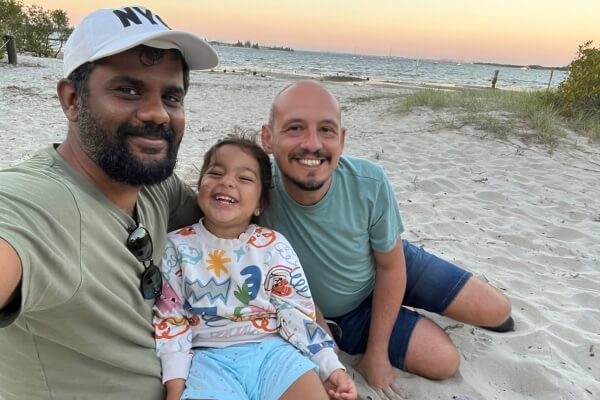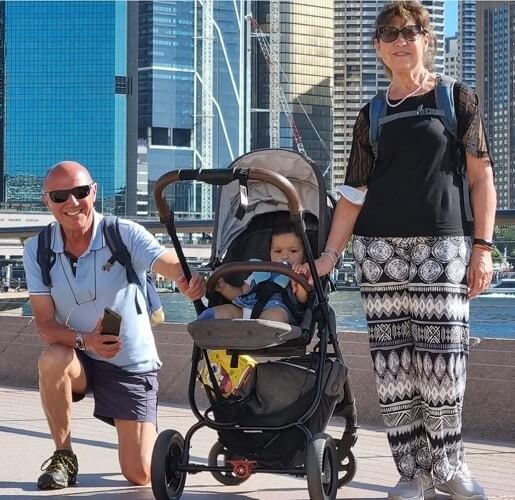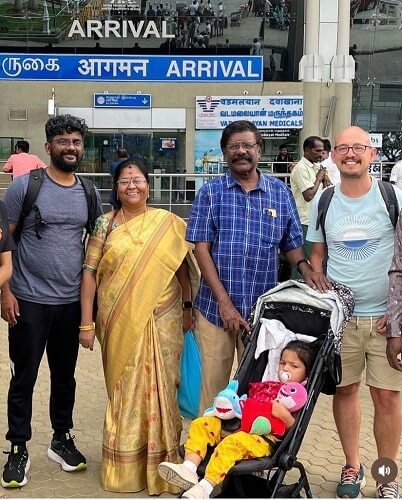Here’s a unique diverse family in Sydney that has captured the hearts of thousands online.
Meet Vignesh Chandrasekaran and Andrea Carboni, a loving, queer couple raising their three-year-old daughter Meenakshi in a household filled with laughter, love, and shared responsibilities.
Through their Instagram account “Dads of Meenakshi,” with over 83.3K followers (and counting), Vignesh and Andrea offer a glimpse into the joys and struggles of gay parenthood, challenging societal norms and inspiring others to embrace love in all its forms.
Facing legal hurdles in their home country of New Zealand, where outdated laws hindered their adoption process, Vignesh, originally from the culturally rich city of Madurai, Tamil Nadu and Andrea, with roots tracing back to Italy, turned to surrogacy as a means of realising their dream of being parents.
The decision to bring Meenakshi into their lives stemmed from a heartfelt conversation, fuelled by their shared longing for parenthood.
“We crossed paths in New Zealand, our shared journey beginning in 2012,” Vignesh told Indian Link. “Over six years, our bond deepened, and like any couple, we dreamt of a future together. The desire to nurture and raise a child together was very high within us. Our respective cultural backgrounds played a significant role in our decision. Family is deeply ingrained in both our cultures, and the idea of creating our own family unit held immense appeal. Conversations turned to the possibility of starting a family, and adoption seemed like a natural choice. However, the reality of outdated laws from the 1960s dashed our hopes in New Zealand. With adoption off the table, we turned to surrogacy.”
However, the road to becoming dads of Meenakshi, was fraught with challenges, both logistical and emotional.
From New Zealand to Australia and eventually to the United States, where their daughter Meenakshi was born, the couple found themselves grappling with the complexities of navigating through the legal systems of three different countries. “It was a challenging time, and to top it, we had to deal with COVID and lockdown,” Vignesh recalled. “We did have support over the phone and all that from friends and family members, but not in person, which was a huge thing at that time.”
Even to arrive at this point had in itself been an arduous journey.
“Just the process of having a baby is very challenging for same-sex couples,” Vignesh noted. “It actually took us four years just to get to the point of deciding on IVF – because it costs a packet! We had to save quite a lot of money.”
Amidst these challenges, Vignesh and Andrea also faced the task of educating and enlightening those around them, particularly their families. In a world where the concept of gay parenting was largely unfamiliar, their families found themselves in uncharted territory.
“Both of our families have never seen a gay couple with a child,” Vignesh shared. “They lacked real-life examples beyond celebrity figures like Elton John!”
Some tough conversations ensued, such as how they would raise a child without a mother figure.
However, with the arrival of Meenakshi, their families witnessed firsthand the love and care that Vignesh and Andrea bestowed upon their daughter. “Despite coming from a different generation with preconceived notions, they saw that men are capable of giving nurture and care to a child,” Vignesh revealed.
Now, says Vignesh, they play an active role as grandparents in their family life, which is incredibly beautiful to see.
“I cherish their involvement and the joy they bring to Meenakshi’s life.”
Reflecting on their journey as dads of Meenakshi, Vignesh and Andrea emphasise the universality of parenthood. Despite societal perceptions, they’ve found no difference in the day-to-day responsibilities of raising Meenakshi compared to heterosexual parents.
As Vignesh aptly put it, “I don’t think your sexual identity matters when it comes to being a parent. In the end, being a parent is about love and responsibility, regardless of sexual identity. Every day, our thoughts revolve around the same things as any other parents: planning meals, scheduling bath times, preparing activities for tomorrow. It’s all about the routine and the instinctual drive to care for our child.”
Vignesh and Andrea approach the topic of their family dynamic with openness and honesty, recognising that Meenakshi, at her young age, already grasps the concept of having two dads. They observe her natural understanding as she interacts with her peers, effortlessly assigning roles in cartoons to fit her family structure. As she grows older and her communication skills develop, they anticipate engaging in more in-depth conversations about family diversity.
How do they plan to address the questions or curiosity Meenakshi may have about their unique family dynamic?
“Engaging in open conversations with children is essential,” Vignesh said. “It’s a natural curiosity that arises, and addressing it openly is crucial. I firmly believe that having these discussions with Meenakshi will foster understanding and acceptance. It’ll just be a part of the normal process of growing up and learning about the world around her.”
In their personal circles and the broader community, the experiences have been predominantly positive, said Vignesh. “Surprisingly, pleasant encounters have outweighed the unpleasant ones. For instance, during a recent visit to India, my parents organised a large family gathering, inviting around 60 to 70 people. It was a heartwarming gesture that touched me deeply. Considering the conservative upbringing they had in Madurai, it was remarkable to witness their openness about my sexuality and our family dynamic with neighbours, friends, and extended family members. Their acceptance and pride in us now are evident, as they wholeheartedly embrace Andrea, Meenakshi, and our journey together as dads of Meenakshi. It’s incredibly gratifying to see how far we’ve come as a family.”
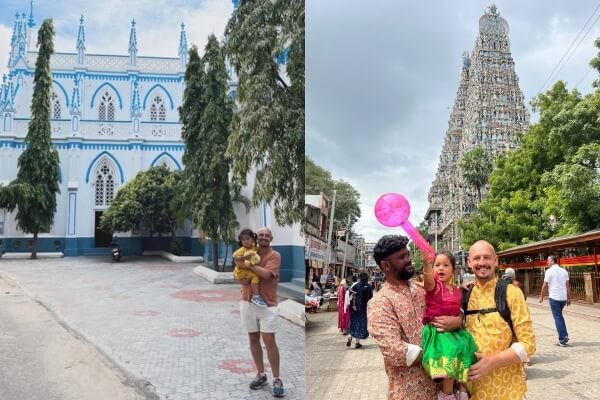
As they navigate through the joys and challenges of parenting, they recognise the impact of their Instagram account and social media platforms on normalising LGBTQ+ parenting and raising awareness, offering hope to others, especially in countries like India where acceptance is still evolving.
Initially, he anticipated that his account would largely attract gay male followers, but he’s been surprised to find that the majority of his followers are actually straight women. Messages of support come from unexpected places. “People have reached out from some really remote places, to say, ‘you’re doing such a great job raising a child.’ I never imagined this would happen. From that sense, it 100% reaches places where you would normally not reach.”
However, Vignesh also highlights the darker side of social media, noting the prevalence of trolling and hate messages, particularly as his posts on ‘Dads of Meenakshi’ gained more traction. The influx of hate messages became so overwhelming at one point that he ceased posting for over a month. Vignesh recounts a particularly alarming incident when he travelled to India with his husband and daughter, receiving threatening messages expressing a desire to harm him. Overall, while social media platforms like Instagram have the potential to raise awareness, Vignesh emphasises the need to address the darker aspects of online behaviour and the importance of creating a safer online environment for all users.
It’s not surprising that he has some advice for others like him contemplating coming out or becoming parents. He stresses that financial stability should precede the decision. “Take care of your financials. The rest will fall into place. I have witnessed firsthand the harsh treatment some young individuals face, including being kicked out of their homes or subjected to conversion therapy, now thankfully outlawed in Australia.”
Vignesh also urges parents and family members to accept their children unconditionally.
“By just accepting your child for who they are, you’re not going to lose anything. They are what you have in your life. Abandoning or disowning your child serves no purpose. If you fail in this, there will be no meaning to your own life. I admit, accepting your child could be a learning process. It could take some time, but it’ll definitely be worth it.”
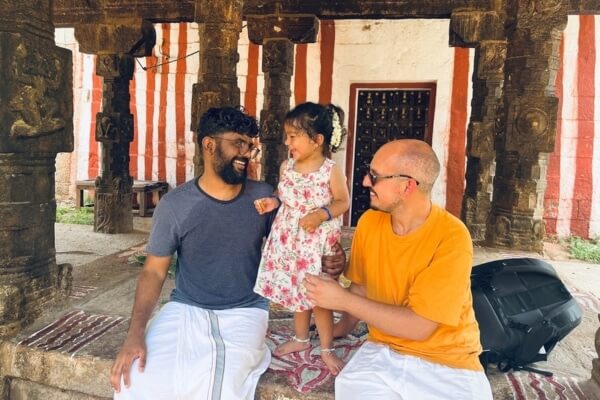
Discussing the disappointing lack of legalisation of same-sex marriages or civil partnerships in India, Vignesh highlighted the dire consequences of this absence of legal recognition citing a case in Kerala, where the death of a gay man reignited the discussion on LGBTQ rights, as his family refused to claim his body. Despite his partner’s desire to handle the funeral arrangements, legal recognition of their relationship prevented him from doing so. This incident underscores the challenges faced by LGBTQ individuals and their partners in accessing basic rights and recognition under existing laws.
“When people think of gay marriages or civil unions, the assumption is that it’s primarily about the celebration, but that’s just a small aspect. What’s truly essential is ensuring the basic rights such as decision-making during critical moments, access to joint assets, and insurance, which straight couples take for granted – these are often overlooked.”
Many couples, including his friends, face uncertainty about their future and mental health challenges due to the lack of legal recognition. Vignesh advocates for at least the establishment of civil unions, which could alleviate many problems without offending cultural or religious sentiments. He also sheds light on the plight of straight women and gay men who are often forced into unwanted marriages due to societal pressures.




